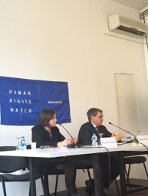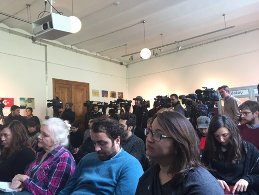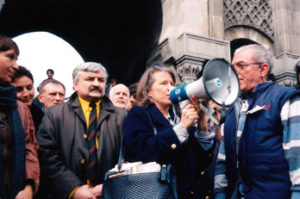View on the Bosphorus: Rights in Retreat
I’m sitting on the Bosphorus today in Istanbul looking across to the Asian side over the balustrade of a European porch. I’ve been visiting Istanbul over the last 20 years for conferences, recently for visits to refugee camps and most often now to see family living here. Istanbul is one of my favorite cities, full of heart, multiple cultures, history and citizens of intellect and warmth.
But recently the atmosphere has chilled. I’ve come on this trip to participate in the launch of Human Rights Watch’s 2016 World Report which focuses on the “Politics of Fear and the Crushing of Civil Society” as causes that imperil citizens’ rights around the world. Istanbul was chosen as the launch city because it sits at the nexus of east and west, is the crossing point for millions of refugees fleeing the Syrian war and has an active civil society and free press that are now severely tested as the environment for rights deteriorates.
“Government-led restrictions on media freedom and freedom of expression in Turkey in 2015 went hand-in-hand with efforts to discredit the political opposition and prevent scrutiny of government policies in the run-up to the two general elections,” according to Human Rights Watch (HRW) 2016 World Report.


The restrictions include the investigation of Cumhuriyet newspaper for posting a report showing weapons on trucks allegedly headed to Syria. The paper’s editor Can Dϋndar and Ankara representative Erdem Gϋl were arrested and are now in jail awaiting trial. Other journalists have been arrested for criticizing the government. There have been police raids on media groups, a widespread firing of journalists perceived to be in opposition to the government, in particular to President Recep Tayyip Erdoğan. Publisher Cevheri Gϋven of Nokta news magazine and editor Murat Çapan spent two months in jail for “inciting an armed insurrection against the government” for a report and a satirical picture of Erdoğan. Nokta’s website remains blocked by a court order. Months of pretrial detention have been handed out to those allegedly insulting Erdoğan via social media and during demonstrations.
I first came to Istanbul in spring, 1997 for the “Initiative for Freedom of Expression”, a conference that brought together PEN International and freedom of expression organizations in Europe to protest the harsh treatment of writers by the Turkish government and courts. Charges had been brought against the celebrated Turkish novelist Yaşar Kemal for an article he wrote for the German magazine Der Spiegel in which he accused the Turkish army of destroying Kurdish villages. Though he was acquitted, he is quoted as saying, “One person’s acquittal does not mean freedom of expression has arrived. You can’t have spring with only one flower. We still have to work very hard to achieve democracy in Turkey. I will continue to write these things until there are no trials against expression.” Kemal passed away last spring at age 91.
At the time activist and song writer Şanar Yurdatapan organized a publication that included Kemal’s essay and the writings of other Turkish and Kurdish writers who had been banned or imprisoned. He mobilized Turkish artists and publishers and academics to sign on as the publisher, and he asked writers from the more than 100 centers of PEN International around the world also to sign on as publisher. The publication thus challenged the government which would have to bring charges against hundreds of people as publisher. And so the Gathering for Freedom of Expression was born.
I chaired PEN International’s Writers in Prison Committee during that time, and along with dozens of writers from around the world, I arrived in Istanbul for the conference. Şanar and his colleagues organized visits to prisons to try to see the many writers and publishers incarcerated, visits to courthouses to observe hearings and trials, a visit to the prosecutor’s office to insist that we too should be charged as publisher. We understood the embarrassment such would cause the government, though none of us aspired to go to a Turkish prison. The Initiative for Freedom of Expression held multiple press conferences because the only legal way to gather at that time was to have a press conference. Yaşar Kemal spoke at one of these.
There was also a freedom of expression conference called at a university where hundreds of students had mobilized in the campus square when we arrived. Many were protesting tuition hikes, not writers in prison, but the two gatherings merged. Riot police surrounded us all as we addressed the crowds.

The period of 1997 in Turkey was charged. The heavy hand of the State was palpable. The police were at every gathering. Cars followed us. In 1997 PEN International recorded more writers in prison or tangled in the judicial processes in Turkey than almost anywhere in the world except perhaps China.
But citizens were mobilizing and claiming space for expression. In the subsequent years the Initiative for Freedom of Expression and other freedom of expression and human rights organizations recorded regularly the abuses and circulated these and mobilized actions. Şanar was sent to prison because of his work and there studied the history and principles of civilian based resistance, practices he had instinctively employed. Every other year the Gathering for Freedom of Expression assembled in Istanbul, several of which I attended. Turkey could mark its progress by the decrease of the numbers of writers and publishers in prison. Until last year.
At the launch of HRW’s World Report this week, Şanar and I met again, smiling to see each other but not smiling about the state of affairs. Turkey appears to be reverting back to the ways and days of the 1990’s. Şanar has returned to song writing, still passionate, but addressing issues through music and advising (not quite on the sidelines) the next generation of activists.
“One person’s acquittal does not mean freedom of expression has arrived. You can’t have spring with only one flower.”
Yes I agree. I have been in this struggle for a long time too and I recognize your references. Turkey was not good for freedom of expression before but what is happening now is worse, definitely. Mainstream publishers threatened with long jail sentences, a bloodbath in the east that nobody can mention for fear of being called a terrorist…on and on. I really hope for better days but do not see them right now.
Thank you Joanne, Your recounting of your personal and political experiences for PEN in Turkey over many years allows us to see the positive effects of social activism and the decline of freedoms at this time.
This is a bad moment in the world, but people continue to struggle for freedom.
As Brecht said: “There will be singing in the bad times…” and your friend Sanar is singing for and with the next generation. Adelante. Gracias , Abrazos.
Joanne,
Am so grateful you ‘speak your mind’ and the rest of us benefit from the keen insight, the compassionate perspective, and the straight-out truth-telling. You help us understand the world we’re living – and how it can and must be better. I especially love knowing the relationships you’ve built over the years cycle back – i.e. with you and Sanar meeting again – smiling, but wisely, as you put it – ‘not about the state of affairs.
Thanks for giving us a window on the world – and then, opening it up for us.
It made me sad to see what is happening in Turkey. When we were there years ago, Turkey was crushed to not be successful in the bid to join the EU. I gather that Turkey still presses the bid hoping for acceptance by 2023, but seems to move farther from western ideas nonetheless.
Photos of children at play in the mall playgrounds and swimming pools of Istanbul seem as if they are from a different country!
Very troubling time. HRW picked the right place to launch the book.
Dear Joanne, As you write about your participation in efforts to challenge repression of expression in Turkey over the years, you let us see the the situation in its ups and downs. It seems that we are at a down moment in so many places in the world. But as Brecht said- There will be singing in the bad times and your friend
Sanar has taken that to heart. The motion of protests in its various forms has not yet been stopped.
You and PeN and many from many lands are part of the affirmation that democracy demands freedom of expression.
As you write us about present repression of expression in Turkey, you allow us to see the ups and downs of the political moment there. We seem to be in a down moment in many parts of the world. Tis more than sad. But as Brecht said- “there will be singing in the sad times” and your friend Sanar seems to have taken that to heart. Let his voice reach where it can.
There are many who continue to bravely protest and to insist on freedom of expression, Let us hear their voices and join the chorus.
Joanne,
It is troubling to see such backsliding on basic freedoms in a country that seeks EU acceptance. Thanks for giving us the benefit of your firsthand experience, which reveals how far Turkey has fallen. And good for Human Rights Watch for shining its light on the problem.
Good day! I could have sworn I’ve visited your blog before but after
looking at a few of the posts I realized it’s new
to me. Nonetheless, I’m definitely delighted I found it and
I’ll be bookmarking it and checking back often!